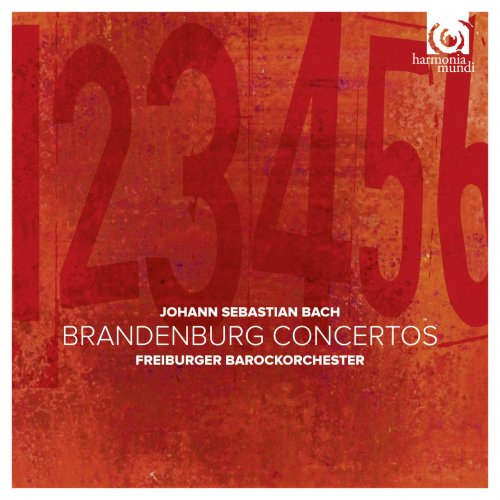
Freiburger Barockorchester - J.S. Bach: Brandenburg Concertos (2014)
BAND/ARTIST: Freiburger Barockorchester
- Title: J.S. Bach: Brandenburg Concertos
- Year Of Release: 2014
- Label: Harmonia Mundi
- Genre: Classical
- Quality: FLAC (tracks) / FLAC (image+.cue,log,scans)
- Total Time: 01:30:01
- Total Size: 522 Mb / 543 Mb
- WebSite: Album Preview
Tracklist:
CD 1
Concerto No.1 In F Major BWV 1046
1. I. [Ohne Satzbezeichnung] 3:52
2. II. Adagio 3:40
3. III. Allegro 3:51
4. IV. Menuet - Trio I - Polonaise - Trio II 6:31
Concerto No.6 In B Flat Major BWV 1051
5. I. [Ohne Satzbezeichnung] 5:31
6. II. Adagio Ma Non Tanto 4:05
7. III. Allegro 5:38
Concerto No.2 In F Major BWV 1047
8. I. [Ohne Satzbezeichnung] 4:49
9. II. Andante 4:04
10. III. Allegro assai 2:37
CD 2
Concerto No.3 In G Major BWV 1048
1. I. [Ohne Satzbezeichnung] - II. Adagio 5:37
2. III. Allegro 4:41
Concerto No.5 In D Major BWV 1050
3. I. Allegro 9:26
4. II. Affettuoso 5:44
5. III. Allegro 5:10
Concerto No.4 In G Major BWV 1049
6. I. Allegro 6:42
7. II. Andante 3:39
8. III. Presto 4:24
Performers:
Freiburger Barockorchester

CD 1
Concerto No.1 In F Major BWV 1046
1. I. [Ohne Satzbezeichnung] 3:52
2. II. Adagio 3:40
3. III. Allegro 3:51
4. IV. Menuet - Trio I - Polonaise - Trio II 6:31
Concerto No.6 In B Flat Major BWV 1051
5. I. [Ohne Satzbezeichnung] 5:31
6. II. Adagio Ma Non Tanto 4:05
7. III. Allegro 5:38
Concerto No.2 In F Major BWV 1047
8. I. [Ohne Satzbezeichnung] 4:49
9. II. Andante 4:04
10. III. Allegro assai 2:37
CD 2
Concerto No.3 In G Major BWV 1048
1. I. [Ohne Satzbezeichnung] - II. Adagio 5:37
2. III. Allegro 4:41
Concerto No.5 In D Major BWV 1050
3. I. Allegro 9:26
4. II. Affettuoso 5:44
5. III. Allegro 5:10
Concerto No.4 In G Major BWV 1049
6. I. Allegro 6:42
7. II. Andante 3:39
8. III. Presto 4:24
Performers:
Freiburger Barockorchester
You'll recall that Bach's Brandenburg Concertos sound different from one another because the composer never meant them as a single, unified group. In 1719 Margrave Christian Ludwig of Brandenburg commissioned Bach to write several musical works for him, and what he got a couple of years later was a collection of six concertos for various-sized ensembles and various solo instruments that Bach had probably written at various times for various other occasions.
The Concerto No. 1 is among the longest of the concertos, and Bach arranged it for the biggest number of players. It is also my least favorite, but that's of no concern. In No. 1 the Freiburg ensemble, playing without a conductor, layer the various sections of music nicely, and in the outer movements keep the rhythms lively and energetic. The Adagio, too, sounds spirited, more so than we usually hear it, yet, appropriately, sounds evenly paced. The whole thing goes by with a steady forward momentum, its third movement of dance tunes filled with vitality.
By the way, you won't mistake the Freiburg Baroque Orchestra for a modern group because they seem to make you aware at all times of the period instruments they use. You won't find here the smooth sonorities and lush textures of a modern orchestra. Instead, the instruments and the playing tend to sound less polished and more rustic, along with other matters like pitch and tempo and bowing. You either accept the period sound or you don't.
Concerto No. 2 is one of the most popular of the concertos and highlights the oboe, recorder, violin, and trumpet, the latter getting in the major part of the playing time. With the Freiburg group No. 2 is quick but never rushed, the music reminding us more than ever that Bach probably intended it as a quartet, since the string accompaniment hardly seem to matter. The trumpet, recorder, oboe, and violin do sound good together, with the trumpet never overpowering the other instruments as it often can in recordings. There is a lovely, animated interplay among the instruments, too, leading to an effective job overall, although I thought the final movement too fast for my taste.
Folks probably recognize Concerto No. 3 as well as they do No. 2, maybe even more so; thus, it's important not to upset their expectations. As the Freiburg orchestra do with the other concertos, they lean to alert, rousing tempos throughout. However, their speedy approach only serves to emphasize the fact that the piece has only two movements to begin with, both of them fast, leaving one a little breathless by the end.
Concerto No. 4 is Bach's most playful piece, with the soloists darting in and out of the structure. It always reminds me of children's music for some reason, Leopold Mozart's Toy Symphony or something like that. Regardless, for me the performance of No. 4 stood out. It's playful, happy, joyous even, with the Freiburg players appearing to have as good a time with it as Bach must have had writing it. Moreover, the sometimes disparate elements of the score seem more cohesive than ever. It's a most-pleasurable experience.
Concerto No. 5 is another of my personal favorites, highlighting solos from the violin, flute, and harpsichord. Because it requires a minimal ensemble, it ensures a greater clarity of sound. Also, a booklet note reminds us that No. 5 may be the first genuine keyboard concerto in history, and certainly the harpsichord player in this one, Sebastian Wienand, performs in virtuosic style.
Even though Concerto No. 6 seems to me the least distinctive music in the set and uses the smallest ensemble, it never actually feels small. In fact, its only real deficiency is its melodic similarity to Concerto No. 3. Whatever, scored for only a handful of players on strings and harpsichord, the Freiburg musicians help No. 6 go by in zippy fashion. It's clearly of a smaller scale than the other concertos, and one has to commend the viola players especially, as they do a splendid job in the solo parts.
The Concerto No. 1 is among the longest of the concertos, and Bach arranged it for the biggest number of players. It is also my least favorite, but that's of no concern. In No. 1 the Freiburg ensemble, playing without a conductor, layer the various sections of music nicely, and in the outer movements keep the rhythms lively and energetic. The Adagio, too, sounds spirited, more so than we usually hear it, yet, appropriately, sounds evenly paced. The whole thing goes by with a steady forward momentum, its third movement of dance tunes filled with vitality.
By the way, you won't mistake the Freiburg Baroque Orchestra for a modern group because they seem to make you aware at all times of the period instruments they use. You won't find here the smooth sonorities and lush textures of a modern orchestra. Instead, the instruments and the playing tend to sound less polished and more rustic, along with other matters like pitch and tempo and bowing. You either accept the period sound or you don't.
Concerto No. 2 is one of the most popular of the concertos and highlights the oboe, recorder, violin, and trumpet, the latter getting in the major part of the playing time. With the Freiburg group No. 2 is quick but never rushed, the music reminding us more than ever that Bach probably intended it as a quartet, since the string accompaniment hardly seem to matter. The trumpet, recorder, oboe, and violin do sound good together, with the trumpet never overpowering the other instruments as it often can in recordings. There is a lovely, animated interplay among the instruments, too, leading to an effective job overall, although I thought the final movement too fast for my taste.
Folks probably recognize Concerto No. 3 as well as they do No. 2, maybe even more so; thus, it's important not to upset their expectations. As the Freiburg orchestra do with the other concertos, they lean to alert, rousing tempos throughout. However, their speedy approach only serves to emphasize the fact that the piece has only two movements to begin with, both of them fast, leaving one a little breathless by the end.
Concerto No. 4 is Bach's most playful piece, with the soloists darting in and out of the structure. It always reminds me of children's music for some reason, Leopold Mozart's Toy Symphony or something like that. Regardless, for me the performance of No. 4 stood out. It's playful, happy, joyous even, with the Freiburg players appearing to have as good a time with it as Bach must have had writing it. Moreover, the sometimes disparate elements of the score seem more cohesive than ever. It's a most-pleasurable experience.
Concerto No. 5 is another of my personal favorites, highlighting solos from the violin, flute, and harpsichord. Because it requires a minimal ensemble, it ensures a greater clarity of sound. Also, a booklet note reminds us that No. 5 may be the first genuine keyboard concerto in history, and certainly the harpsichord player in this one, Sebastian Wienand, performs in virtuosic style.
Even though Concerto No. 6 seems to me the least distinctive music in the set and uses the smallest ensemble, it never actually feels small. In fact, its only real deficiency is its melodic similarity to Concerto No. 3. Whatever, scored for only a handful of players on strings and harpsichord, the Freiburg musicians help No. 6 go by in zippy fashion. It's clearly of a smaller scale than the other concertos, and one has to commend the viola players especially, as they do a splendid job in the solo parts.

Classical | FLAC / APE | CD-Rip
As a ISRA.CLOUD's PREMIUM member you will have the following benefits:
- Unlimited high speed downloads
- Download directly without waiting time
- Unlimited parallel downloads
- Support for download accelerators
- No advertising
- Resume broken downloads


